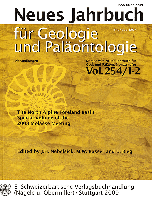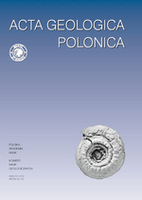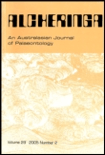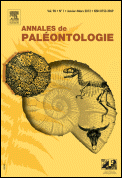
RIVISTA ITALIANA DI PALEONTOLOGIA E STRATIGRAFIA
metrics 2024
Empowering Scholars with Open Access to Earth Science
Introduction
RIVISTA ITALIANA DI PALEONTOLOGIA E STRATIGRAFIA, published by Università degli Studi di Milano, is a leading open access journal dedicated to the fields of Paleontology, Geology, and Stratigraphy. Established in 1979, this prestigious journal fosters the dissemination of high-quality research and innovative studies within these disciplines, holding a commendable Q2 ranking in Geology, Paleontology, and Stratigraphy as of 2023. The journal’s commitment to accessibility since 2016 underlines its objective to promote the sharing of knowledge among researchers, professionals, and students alike. With its notable Scopus rankings reflecting a solid performance in the Earth and Planetary Sciences, particularly in Paleontology and Stratigraphy, RIVISTA ITALIANA serves as a vital resource for those seeking to stay informed on the latest advancements and discoveries within the geological sciences. For further inquiries, the editorial office is located at C/O RIVISTA ITALIANA PALEONTOLOGIA STRATIGRAFIA, VIA MANGIAGALLI, 34, 20133 MILANO, ITALY.
Metrics 2024
 0.58
0.58 1.60
1.60 1.70
1.70 43
43Metrics History
Rank 2024
Scopus
IF (Web Of Science)
JCI (Web Of Science)
Quartile History
Similar Journals

PALAEONTOGRAPHICA ABTEILUNG A-PALAOZOOLOGIE-STRATIGRAPHIE
Advancing Knowledge: Pioneering Research in Paleobiology and StratigraphyPalaeontographica Abteilung A-Palaozoologie-Stratigraphie is a prominent academic journal that serves as a vital resource for researchers in the fields of Paleontology and Stratigraphy. Published by E Schweizerbart'sche Verlagsbuchhandlung in Germany, this journal has been instrumental in disseminating cutting-edge research from 1996 to 2024. With an established reputation highlighted by its Q3 ranking in both Paleontology and Stratigraphy, it ranks 26th among 113 journals in Paleontology and 15th among 55 in Stratigraphy, showcasing its significance within the scientific community. Although it does not currently offer open access, the journal provides an invaluable platform for the exchange of innovative ideas and findings in paleobiological and stratigraphic studies. As such, Palaeontographica continues to attract contributions from leading academics, making it an indispensable publication for professionals and students alike who are eager to advance their understanding of Earth's historical biological and geological patterns.

PALEONTOLOGICAL JOURNAL
Delving into Fossils, Discovering History.The PALEONTOLOGICAL JOURNAL, published by PLEIADES PUBLISHING INC, is a premier platform for the dissemination of research in the field of paleontology. With an ISSN of 0031-0301 and E-ISSN 1555-6174, this journal serves the academic community by providing insights into fossil studies, evolutionary biology, and the historical narrative of life on Earth. Despite being categorized in the Q3 quartile for 2023 and currently holding a Scopus rank of #84 out of 113 in the Earth and Planetary Sciences- Paleontology category, it remains a valuable resource for researchers and practitioners. The journal's coverage spans from 1990 to 2024, offering a comprehensive historical perspective while also addressing contemporary issues in paleological research. Scholars and students alike benefit from its rigorous peer-reviewed articles and the opportunity to access vital knowledge in the ever-evolving field of paleontology.

ANNALES SOCIETATIS GEOLOGORUM POLONIAE
Connecting Researchers to the Heart of Geological Science.ANNALES SOCIETATIS GEOLOGORUM POLONIAE is a distinguished journal published by the Polish Geological Society, focusing on pivotal research in the fields of geology, economic geology, and stratigraphy. With an ISSN of 0208-9068, this journal has established itself as an essential platform for disseminating significant findings and advancements in geological sciences since its convergence in 2008. The journal proudly holds a Q2 quartile ranking in the categories of Economic Geology, Geology, and Stratigraphy as of 2023, indicating its respectable position within the global academic community. Researchers will find its indexed status in Scopus, ranking #138/321 in Geology and showcasing a solid presence in key geological sub-disciplines. While the journal is not open access, it remains a vital resource for professionals and students striving for insight into contemporary geological research. Located in Krakow, Poland, the journal continues to contribute significantly to the understanding of geological processes and resources, making it an indispensable reference for anyone in the field.

NEUES JAHRBUCH FUR GEOLOGIE UND PALAONTOLOGIE-ABHANDLUNGEN
Illuminating the Path of Geological DiscoveryNEUES JAHRBUCH FUR GEOLOGIE UND PALAONTOLOGIE-ABHANDLUNGEN, published by E SCHWEIZERBARTSCHE VERLAGSBUCHHANDLUNG, is a distinguished scholarly journal based in Germany that has made significant contributions to the field of Earth and Planetary Sciences with a particular emphasis on Paleontology. With its ISSN: 0077-7749, this journal provides an essential platform for researchers, professionals, and students to explore cutting-edge research and developments that enhance our understanding of geological and paleontological processes. Boasting a robust ranking of #67 out of 113 in Scopus for the category of Earth and Planetary Sciences and achieving a Q3 quartile ranking in Paleontology, it stands as a significant resource in the global academic community. Though not an open-access journal, it offers valuable insights from 1987 onwards, ensuring a comprehensive archive of high-quality research articles published from 1995 to 2024. Its scholarly impact continues to resonate, making it a vital reference point for advancements in the ever-evolving disciplines of geology and paleontology.

REVISTA BRASILEIRA DE PALEONTOLOGIA
Uncovering the Past, Shaping the Future of PaleontologyREVISTA BRASILEIRA DE PALEONTOLOGIA (ISSN: 1519-7530, E-ISSN: 2236-1715) is a premier academic journal dedicated to the field of paleontology, published by the esteemed SOCIEDADE BRASILEIRA DE PALEONTOLOGIA. Operating under a Q3 quartile ranking in the 2023 Scopus statistics for Paleontology, this journal serves as a vital platform for researchers, professionals, and students to disseminate and engage with cutting-edge discoveries and methodologies in paleontological studies. With a broad scope that encompasses various aspects of Earth's historical life, REVISTA BRASILEIRA DE PALEONTOLOGIA provides an essential resource for the scientific community, particularly those based in Brazil and South America. The journal is committed to promoting rigorous research and fostering collaboration among scholars, ultimately contributing to advancements in the understanding of past biodiversity and extinction events. Its thoughtful curation of articles since 2010 ensures that it remains at the forefront of paleontological scholarship, despite its limited HIndex and open access options. This journal is a crucial asset for anyone looking to deepen their understanding of evolutionary processes that have shaped our planet.

ACTA GEOLOGICA POLONICA
Advancing geological knowledge for a sustainable future.ACTA GEOLOGICA POLONICA is a distinguished journal published by the Polska Akademia Nauk, in collaboration with the University of Warsaw's Geology Department. Since its inception, it has served as a vital platform for disseminating innovative research in the field of Geology, reflecting a commitment to advancing scientific knowledge in Earth and planetary sciences. With an ISSN of 0001-5709 and an E-ISSN of 2300-1887, this journal provides a rigorous review process and is classified in the Q3 quartile for Geology as of 2023, indicating its growing influence in the discipline. Despite not being open access, the journal facilitates meaningful contributions that span a range of geological topics from fundamental research to applied sciences, thereby enriching the academic landscape. Researchers, professionals, and students alike are encouraged to engage with the valuable findings and discussions contained within its pages, which continue to shape the future of geological inquiry.

ALCHERINGA
Fostering Insights in Ecology, Evolution, and BeyondALCHERINGA, published by Taylor & Francis Ltd, is a distinguished academic journal that has been at the forefront of research in the fields of ecology, evolution, behavior, systematics, and paleontology since its inception in 1975. With an ISSN of 0311-5518 and E-ISSN 1752-0754, this journal serves as a critical platform for the dissemination of high-quality research, contributing significantly to the understanding of biological and geological sciences. Ranking in the Q3 quartile for both Ecology, Evolution, Behavior and Systematics, as well as Paleontology, ALCHERINGA is well-positioned within the academic community, attracting submissions from researchers across the globe. The journal's Scopus ranks further highlight its relevance, particularly its position in the 51st percentile for Ecology and the 50th percentile for Paleontology. Although it does not operate under an open access model, ALCHERINGA remains committed to providing valuable insights and fostering discussions that are essential for the advancement of these vital scientific disciplines. Researchers, professionals, and students are encouraged to explore the profound implications of the studies published within, making it an indispensable resource for anyone aiming to deepen their expertise in these fields.

CARNETS DE GEOLOGIE
Illuminating the Past, Shaping the Future of GeologyCarnets de Geologie is a prominent open-access journal dedicated to the dynamic fields of geology, paleontology, and stratigraphy. Published by Carnets Geologie and based in France, the journal has been a platform for scholarly communication since 2002, facilitating unrestricted access to high-quality research. With a robust impact reflected in its 2023 quartile rankings—Q2 in Geology, Paleontology, and Stratigraphy—Carnets de Geologie ranks favorably within Scopus, positioning itself at the 60th percentile for Earth and Planetary Sciences. The journal aims to disseminate innovative research findings and foster academic discourse among researchers, professionals, and students interested in the intricate aspects of Earth's history and processes. Encompassing a broad scope that reflects continuous developments in the geological sciences, Carnets de Geologie is dedicated to advancing knowledge and understanding within its community.

STRATIGRAPHY AND GEOLOGICAL CORRELATION
Exploring the Layers of Earth’s HistorySTRATIGRAPHY AND GEOLOGICAL CORRELATION is a prominent scholarly journal published by PLEIADES PUBLISHING INC, featuring a dedicated focus on the fields of geology, stratigraphy, and paleontology. With ISSN 0869-5938 and E-ISSN 1555-6263, this journal has been disseminating significant research findings since its inception in 1994, continuously contributing to the academic discourse through 2024. Despite not currently offering open access, its relevance is underscored by its Category Quartiles for 2023, where it has established itself as Q3 in Geology and Paleontology, and Q2 in Stratigraphy. STRATIGRAPHY AND GEOLOGICAL CORRELATION ranks #29 out of 55 in Stratigraphy and #186 out of 321 in Geology according to Scopus metrics, positioning it within the competitive landscape of Earth and Planetary Sciences. Researchers, professionals, and students are invited to engage with the journal’s content to deepen their understanding and foster innovation within these critical areas of study.

ANNALES DE PALEONTOLOGIE
Unearthing the Past, Shaping the FutureANNALES DE PALEONTOLOGIE is a distinguished academic journal published by MASSON EDITEUR that plays a pivotal role in the field of paleontology. With an ISSN of 0753-3969 and an E-ISSN of 1778-3666, this journal has been a vital resource since its inception in 1988, continuously contributing to the advancement of knowledge in Earth and Planetary Sciences, particularly focusing on paleontological research. Currently ranked #68 out of 113 in its category by Scopus, and celebrated for its Q2 quartile standing, ANNALES DE PALEONTOLOGIE publishes innovative studies, reviews, and discussions that appeal to a diverse audience of researchers, professionals, and students. The journal aims to foster a deeper understanding of paleontological phenomena and encourages interdisciplinary collaboration within the scientific community. Although it is not an open access journal, its commitment to scholarly excellence ensures that the content is highly regarded and widely referenced in academic circles. Situated in Issy-les-Moulineaux, France, it continues to maintain a global readership while promoting significant advancements in paleontological research.